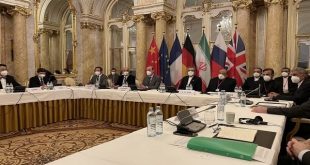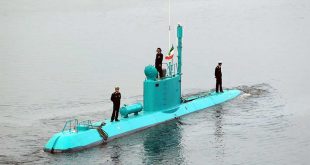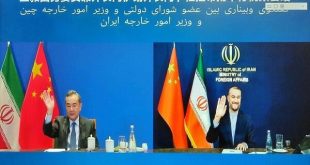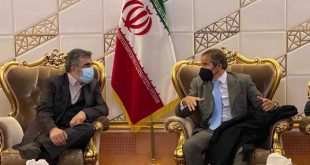TEHRAN (FNA)- Iran’s Permanent Ambassador to Vienna-Based International Organizations Kazzem Qaribabadi said that the latest report by the UN nuclear watchdog proves that his country has continued cooperation with the International Atomic Energy Agency (IAEA).
Qaribabadi told reporters on Wednesday that the new report shows the IAEA’s continued verification of the country’s nuclear program.
He added that based on the report, in addition to heavy water production and storage, Iran has exported more than 2.2 tons of its heavy water and also utilized 1.3 tons in line with its research and development activities.
He said the report states that Iran has continued its uranium enrichment activities in Natanz and Fordow sites, using new machines, and enriching uranium up to 4.5% purity, which is beyond the 3.67% limit set in the nuclear agreement, which is officially known as the Joint Comprehensive Plan of Action (JCPOA).
In addition, he added, the report mentions Iran’s recent decision to relocate its R&D centrifuges underground in Natanz and states that the country has declared it will consider safeguard requirements.
According to Qaribabadi, “the IAEA report has announced the amount of Iran’s uranium reserves is about 2,442.9 kg as of November 2, which is equal to about 3,600 kg of low-enriched uranium.”
He also pointed to the report’s reference to the results of the IAEA’s inspection of one of the country’s sites in 2018, and said that despite the differences in Iran’s technical views with the IAEA, interactions in that area are still ongoing between the two sides with the aim of resolving the issue.
Separately, Iran’s Ambassador to the United Nations Majid Takht-Ravanchi told a meeting of the UN General Assembly that Tehran believes the IAEA must fulfil its verification duty in a way that it does not overshadow the member states’ inalienable right to reinforce their peaceful use of nuclear energy.
Even the non-proliferation concerns should not limit the member states’ rights, he said, adding that the international community must reject any attempt to restrict peaceful use of nuclear energy.
He said over the past year, 22 percent of all the IAEA’s inspections have been carried out in Iran, and the watchdog’s activities have not stopped in the Islamic Republic even at the peak of the coronavirus outbreak.
Iran signed the JCPOA with six world states — namely the US, Germany, France, Britain, Russia and China — in 2015.
US President Donald Trump, a stern critic of the historic deal, unilaterally pulled Washington out of the JCPOA in May 2018, and unleashed the “toughest ever” sanctions against the Islamic Republic in defiance of global criticism in an attempt to strangle the Iranian oil trade, but to no avail since its “so-called maximum pressure policy” has failed to push Tehran to the negotiating table.
In response to the US’ unilateral move, Tehran has so far rowed back on its nuclear commitments four times in compliance with Articles 26 and 36 of the JCPOA, but stressed that its retaliatory measures will be reversible as soon as Europe finds practical ways to shield the mutual trade from the US sanctions.
Tehran has particularly been disappointed with failure of the three European signatories to the JCPOA — Britain, France and Germany — to protect its business interests under the deal after the United States’ withdrawal.
On January 5, Iran took a final step in reducing its commitments, and said it would no longer observe any operational limitations on its nuclear industry, whether concerning the capacity and level of uranium enrichment, the volume of stockpiled uranium or research and development.
https://chat.whatsapp.com/Fava5Ifru8330dDMfhs0gn
 WILAYAH NEWS VOICE OF THE GLOBAL AWAKENING
WILAYAH NEWS VOICE OF THE GLOBAL AWAKENING






